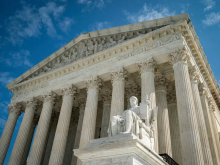
The U.S. Supreme Court curbed the EPA's ability to fight climate change.
Al Drago/Getty Images
The U.S. Supreme Court on Thursday dealt a major blow to the Environmental Protection Agency's power to regulate carbon emissions that cause climate change. The decision by the conservative court majority sets the stage for further limitations on the regulatory power of other agencies as well.
By a vote of 6 to 3, the court said that any time an agency does something big and new – in this case addressing climate change – the regulation is presumptively invalid, unless Congress has specifically authorized regulating in this sphere.
"That's a very big deal because they're not going to get it from Congress because Congress is essentially dysfunctional," said Harvard law professor Richard Lazarus, an expert on environmental law. "This could not have come at a worse time" because "the consequences of climate change are increasingly dire and we're running out of time to address it."
As Case Western Reserve professor Jonathan Adler put it, "The Court is definitely sending a signal to regulatory agencies more broadly that they only have the power that Congress delegated to them, and that agencies need to think twice before they try to pour new wine out of old bottles."
In other words, an agency "can't simply retrofit an old statute to create new tools or new mechanisms" to address a problem that is generally within the agency's jurisdiction.
In terms of climate change, Lazarus believes it will have an immediate effect. "Remember when Joe Biden was elected he said we're going to use a whole big government approach to climate change, not just EPA regulation. Well, that whole government approach may now find itself under a cloud of this court's opinion."
The issue before the court was how the EPA can regulate coal-fired power plants, which in this country are the single largest source of carbon emissions that cause climate challenge. The Obama administration set state-by-state carbon limits and encouraged states to rely less on coal and more on alternative energy sources. Even though the program was blocked by the courts, it met its targets 11 years ahead of schedule for the simple reason that it turned out coal was too expensive compared to other power generating sources.
But on Thursday, the Supreme Court turned thumbs down on any such systemic approach. Bringing to life what the court has called "the major questions doctrine," the court said that neither the EPA nor any other agency may adopt rules that are transformational to the economy--unless Congress has specifically authorized such a rule to address a specific problem, like climate change. Writing for the court majority, Chief Justice John Roberts said that under what the court has recently called the "major questions doctrine," neither the EPA nor any other agency may adopt rules that are "transformational" to the economy — unless Congress has specifically authorized such a transformative rule to address a specific problem, like climate change. In "certain extraordinary cases, both separation of powers principles and a practical understanding of legislative intent make us 'reluctant to read into ambiguous statutory text' the delegation claimed to be lurking there," Roberts writes. "To convince us otherwise, something more than a merely plausible textual basis for the agency action is necessary. The agency instead must point to 'clear congressional authorization' for the power it claims." Justice Elena Kagan, in a furious dissent, said essentially that the Court is making up new rules that contradict nearly a century of regulatory law. The text of the Clean Air Act, she said, clearly anticipates that the EPA will have to deal with new problems and uses broad language to allow that. The Court majority, she says, "does not have a clue about how to address climate change...yet it appoints itself, instead of congress or the expert agency...the decision-maker on climate policy. I cannot think of many things more frightening." She was joined by the court's other two liberals. The decision appears to enact major new limits on agency regulations across the economy, limits of a kind not imposed by the court for 75 years or more. The decision, for instance, casts a cloud of doubt over a proposed Securities and Exchange Commission rule that would require companies offering securities to the public to disclose climate-related risks – like severe weather events that have or likely will affect their business models. Also in jeopardy is a new interim rule adopted by the Federal Energy Regulatory Commission "aimed at treating greenhouse gas emissions and their contribution to climate change the same as all other environmental impacts [the Commission] considers." The decision was a particularly bad omen for environmentalists. In a very real sense, it seemed to reject any holistic regulatory attempt to deal with climate change. By Nina Totenberg
